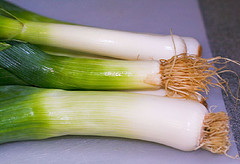Leek
| Infobox on Leek | |
|---|---|
| Example of Leek |  |
| Freshness facts | |
| Optimum carrying temperature | 0°C |
| Highest freezing point | -0,7°C |
| Acceptable product temp. at loading into containers | Max. 2°C above carrying temperature |
| Optimum humidity | 95% to 100% |
| Ventilation setting for containers | 10 m³/hr |
| Storage life | 1 to 3 months |
| Climacteric / non-climacteric | Non-climacteric |
| Ethylene production | Very low |
| Ethylene sensitivity | Medium |
| Modified / controlled atmosphere | 1% to 3% O2; 5% CO2 |
| Potential benefits | Fairly good; see text |
| Availability | |
| On demand | |
Leek
Contents
Harvesting and Handling
The edible portion of leek consists of the elongated bases of the foliage leaves (a false stem) and the lower parts, blanched white from being underground.
Good quality leeks are firm and smooth, free of blemishes, and have characteristic white stems with dark green leaves. The cut bottoms should be flat, as rounded bottoms may indicate prolonged storage.
Leeks are commonly trimmed so that only approx. 30 cm. portion of the green top remains. They can, depending on diameter, be bunched in groups and placed in polyethylene film bags to prevent moisture loss.
Cultivar, pre-harvest and postharvest conditions, degree of trimming, and method of packing will all influence the storage life of leeks.
Cooling and Storage
Prompt pre-cooling of harvested leeks to 0°C is essential.
Leeks can be stored for 2 to 3 months at 0°C with 95% to 100% RH. High RH is essential to prevent wilting. Good refrigeration retards elongation and curvature that develops in leeks at 10°C to 21°C.
Respiration or heat evolution of leeks is about eight times faster at 21°C than at 0°C.
Leeks are not sensitive to chilling temperatures and should be stored as cold as possible without freezing.
Controlled atmosphere considerations
Storage for 4 to 5 months at 0°C is possible with CA, although there will be some loss of quality.
Leeks produce very low levels of ethylene and are moderately sensitive to ethylene. Detrimental effects include softening and increased decay.
Storage disorders
Bacterial soft rot, Black leaf stripe, Downy mildew, Grey mould rot, Blotch, Yellowing.











